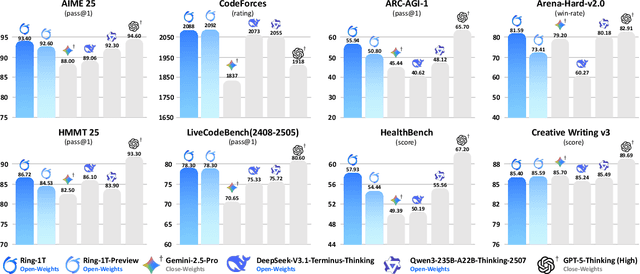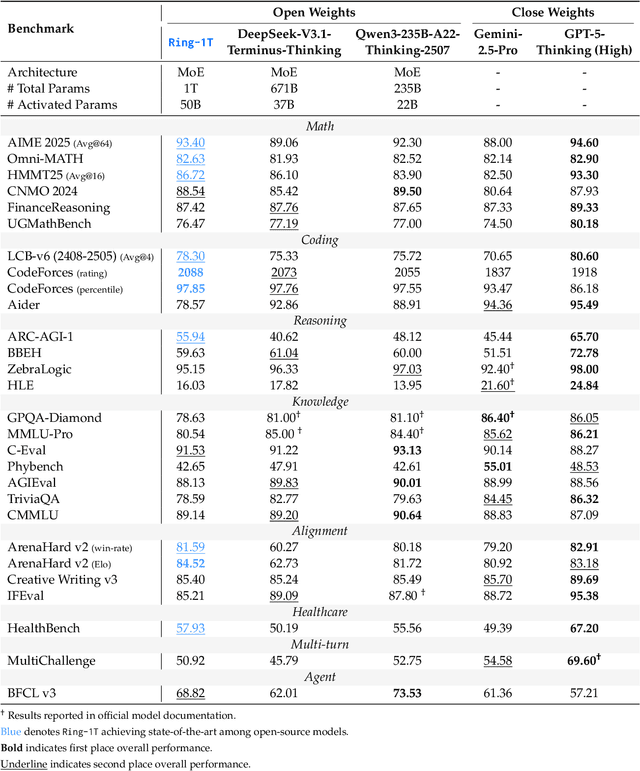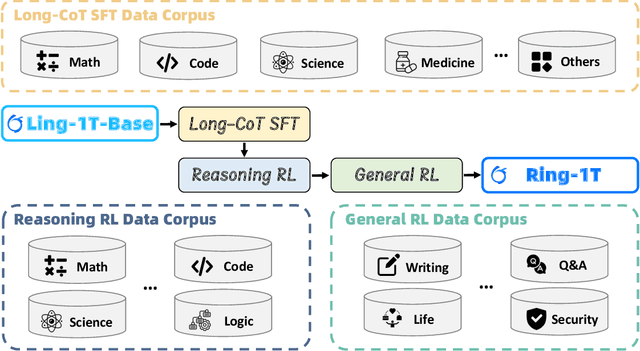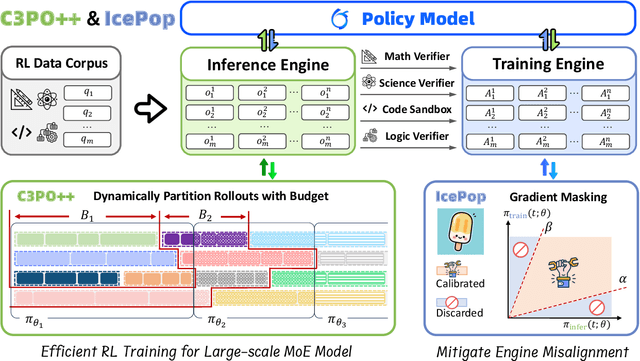Deng Zhao
Every Step Evolves: Scaling Reinforcement Learning for Trillion-Scale Thinking Model
Oct 21, 2025



Abstract:We present Ring-1T, the first open-source, state-of-the-art thinking model with a trillion-scale parameter. It features 1 trillion total parameters and activates approximately 50 billion per token. Training such models at a trillion-parameter scale introduces unprecedented challenges, including train-inference misalignment, inefficiencies in rollout processing, and bottlenecks in the RL system. To address these, we pioneer three interconnected innovations: (1) IcePop stabilizes RL training via token-level discrepancy masking and clipping, resolving instability from training-inference mismatches; (2) C3PO++ improves resource utilization for long rollouts under a token budget by dynamically partitioning them, thereby obtaining high time efficiency; and (3) ASystem, a high-performance RL framework designed to overcome the systemic bottlenecks that impede trillion-parameter model training. Ring-1T delivers breakthrough results across critical benchmarks: 93.4 on AIME-2025, 86.72 on HMMT-2025, 2088 on CodeForces, and 55.94 on ARC-AGI-v1. Notably, it attains a silver medal-level result on the IMO-2025, underscoring its exceptional reasoning capabilities. By releasing the complete 1T parameter MoE model to the community, we provide the research community with direct access to cutting-edge reasoning capabilities. This contribution marks a significant milestone in democratizing large-scale reasoning intelligence and establishes a new baseline for open-source model performance.
Ring-lite: Scalable Reasoning via C3PO-Stabilized Reinforcement Learning for LLMs
Jun 18, 2025Abstract:We present Ring-lite, a Mixture-of-Experts (MoE)-based large language model optimized via reinforcement learning (RL) to achieve efficient and robust reasoning capabilities. Built upon the publicly available Ling-lite model, a 16.8 billion parameter model with 2.75 billion activated parameters, our approach matches the performance of state-of-the-art (SOTA) small-scale reasoning models on challenging benchmarks (e.g., AIME, LiveCodeBench, GPQA-Diamond) while activating only one-third of the parameters required by comparable models. To accomplish this, we introduce a joint training pipeline integrating distillation with RL, revealing undocumented challenges in MoE RL training. First, we identify optimization instability during RL training, and we propose Constrained Contextual Computation Policy Optimization(C3PO), a novel approach that enhances training stability and improves computational throughput via algorithm-system co-design methodology. Second, we empirically demonstrate that selecting distillation checkpoints based on entropy loss for RL training, rather than validation metrics, yields superior performance-efficiency trade-offs in subsequent RL training. Finally, we develop a two-stage training paradigm to harmonize multi-domain data integration, addressing domain conflicts that arise in training with mixed dataset. We will release the model, dataset, and code.
SHARP: Synthesizing High-quality Aligned Reasoning Problems for Large Reasoning Models Reinforcement Learning
May 21, 2025Abstract:Training large reasoning models (LRMs) with reinforcement learning in STEM domains is hindered by the scarcity of high-quality, diverse, and verifiable problem sets. Existing synthesis methods, such as Chain-of-Thought prompting, often generate oversimplified or uncheckable data, limiting model advancement on complex tasks. To address these challenges, we introduce SHARP, a unified approach to Synthesizing High-quality Aligned Reasoning Problems for LRMs reinforcement learning with verifiable rewards (RLVR). SHARP encompasses a strategic set of self-alignment principles -- targeting graduate and Olympiad-level difficulty, rigorous logical consistency, and unambiguous, verifiable answers -- and a structured three-phase framework (Alignment, Instantiation, Inference) that ensures thematic diversity and fine-grained control over problem generation. We implement SHARP by leveraging a state-of-the-art LRM to infer and verify challenging STEM questions, then employ a reinforcement learning loop to refine the model's reasoning through verifiable reward signals. Experiments on benchmarks such as GPQA demonstrate that SHARP-augmented training substantially outperforms existing methods, markedly improving complex reasoning accuracy and pushing LRM performance closer to expert-level proficiency. Our contributions include the SHARP strategy, framework design, end-to-end implementation, and experimental evaluation of its effectiveness in elevating LRM reasoning capabilities.
RJUA-QA: A Comprehensive QA Dataset for Urology
Dec 28, 2023



Abstract:We introduce RJUA-QA, a novel medical dataset for question answering (QA) and reasoning with clinical evidence, contributing to bridge the gap between general large language models (LLMs) and medical-specific LLM applications. RJUA-QA is derived from realistic clinical scenarios and aims to facilitate LLMs in generating reliable diagnostic and advice. The dataset contains 2,132 curated Question-Context-Answer pairs, corresponding about 25,000 diagnostic records and clinical cases. The dataset covers 67 common urological disease categories, where the disease coverage exceeds 97.6\% of the population seeking medical services in urology. Each data instance in RJUA-QA comprises: (1) a question mirroring real patient to inquiry about clinical symptoms and medical conditions, (2) a context including comprehensive expert knowledge, serving as a reference for medical examination and diagnosis, (3) a doctor response offering the diagnostic conclusion and suggested examination guidance, (4) a diagnosed clinical disease as the recommended diagnostic outcome, and (5) clinical advice providing recommendations for medical examination. RJUA-QA is the first medical QA dataset for clinical reasoning over the patient inquiries, where expert-level knowledge and experience are required for yielding diagnostic conclusions and medical examination advice. A comprehensive evaluation is conducted to evaluate the performance of both medical-specific and general LLMs on the RJUA-QA dataset. Our data is are publicly available at \url{https://github.com/alipay/RJU_Ant_QA}.
 Add to Chrome
Add to Chrome Add to Firefox
Add to Firefox Add to Edge
Add to Edge